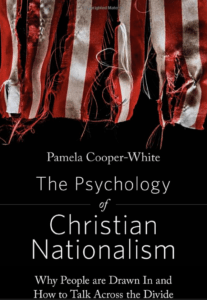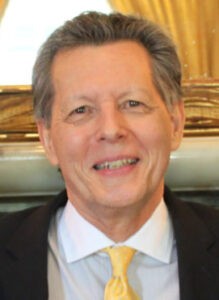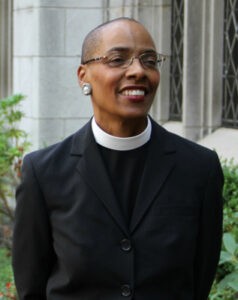Author Pamela Cooper-White believes it is still possible to engage in healthy dialogue with Americans who have plunged wholeheartedly into right-wing conspiracy theories and white supremacist ideologies.
But she admits it may be hard to approach hard-core QAnon adopters and those who fervently believe the United States should be an exclusively Christian nation.

Pamela Cooper-White
“When it comes to a firmly entrenched Christian nationalist, we do have to remember that we are trying to dispute not only an individual but their favorite TV network and the ever self-reinforcing bubble of opinion fed to them on social media through algorithms sifting through their clicks and likes, and the hundreds or even thousands of members of their church where they just praise Jesus and ask him to save the United States while listening to heart-thumping rock music and indoctrinating sermons,” she said during an April 27 event celebrating the release of her new book, The Psychology of Christian Nationalism: Why People are Drawn In and How to Talk Across the Divide.
Cooper-White serves as vice president for academic affairs and dean at Union Theological Seminary in New York. At the release event, she was joined in a panel discussion by Union faculty members Gary Dorrien, Kelly Brown Douglas and Cornel West.
Cooper-White suggested “a triage approach” to determine when to engage, or not engage, Christian nationalists in dialogue. People who may be “soft” adherents to the worldview may be more easily approached than staunch supporters, and the exchange should never be judgmental or combative, she advised.
“We are trying to talk with QAnon, so argumentation will not work. And we do need to walk away whenever we perceive that to continue in a one-sided dialogue will violate our own sense of personal integrity.”
 The modern political and theological divide can be hard to breach given white Christian nationalism’s mixing of fundamentalist scriptural interpretation and right-wing and authoritarian political impulses, she said. “A common belief among Christian nationalists is that there has been a woeful decline in America’s standing in the world because of the nation’s growing degeneracy, and with it the commitment, the belief, in an urgent call to restore the nation to its original goodness and mandate to lead the world into godliness.”
The modern political and theological divide can be hard to breach given white Christian nationalism’s mixing of fundamentalist scriptural interpretation and right-wing and authoritarian political impulses, she said. “A common belief among Christian nationalists is that there has been a woeful decline in America’s standing in the world because of the nation’s growing degeneracy, and with it the commitment, the belief, in an urgent call to restore the nation to its original goodness and mandate to lead the world into godliness.”
Christian nationalists typically believe God has withdrawn blessing from America for violating God’s laws and for abandoning the nation’s special mandate as established by the founders, she said. Historians and theologians counter this narrative, saying the U.S. was not founded as a “Christian nation.”
“Christian nationalist preachers tend to leap across the Bible from the Old Testament to the book of Revelation, making scant reference, if at all, to the teachings of Jesus about love, healing and justice,” Cooper-White said.
And adherents to this outlook often are drawn to a sense of purpose and belonging by leaders using cult recruiting tactics, she added. They fear loss of social and economic status because of immigration and maintain a desire to regain white supremacy.
“According to the Census Bureau, the year 2042 will mark the end of a white majority population in the United States,” she explained. “They know it and they fear it. They also fear the loss of patriarchal authority and masculine hierarchy, both in the home and in public sphere of work and governmental power.”
“They also fear the loss of patriarchal authority and masculine hierarchy, both in the home and in public sphere of work and governmental power.”
Donald Trump appealed to this group of Americans for reasons that went far beyond conservative policies on abortion, welfare, immigration and gender and racial justice, Cooper-White added. “Trump further tapped into a deep and broad reservoir of resentment and paranoia that has been accumulating for decades — a large pool of Christians who feel they are being persecuted and are called by God to rise up and defend themselves against their enemies. And not only must they regain equal footing with others in society, many believe they must dominate and be in control, and all in the blessed name of Jesus. This growing movement of desperate, would-be Christian conquerors is referred to as Christian nationalism.”
Many ordinary Christians are perplexed at how their neighbors have become twisted up in the web of lies of white Christian nationalism while still claiming to believe in a Jesus of love, mercy and justice, Cooper-White said. “It’s my hope that the psychology of groups might provide some at least partial answer by illuminating both the conscious and unconscious allure of Christian nationalism and how people can be convinced of false and even delusional beliefs especially under the influence of a charismatic leader.”

Gary Dorrien
Christian nationalism must be understood in relation to issues of education and social class, said Dorrien, a theologian and professor of social ethics.
“The political party that Trump took over is thriving politically on the strength of its utter domination of the white electorate that never attended college and now fears it is being replaced. The education gap is momentous and growing. In raw political terms, it portends a coming blood bath for Democrats in the next election and the one after that.”
Dorrien also sought to dispel the notion that Christian nationalists are limited to poor whites: “The white working class in this country is no more racist than the rest of white America, and a lot of those bikers at Trump rallies are middle class people sitting on very expensive machines.”

Kelly Brown Douglas
The Psychology of Christian Nationalism demonstrates that white Christian nationalism is not a 21st century phenomenon “that will go away with Trump,” said Brown Douglas, dean of the Episcopal Divinity School and chair of theology at Union. “But it is a part of our national and of our Christian story that we must unearth and understand all of the complex realities that lead to it. … If we don’t recognize and address that legacy and that reality, we can never really address the realities of white Christian nationalism and begin to dismantle that.”
But the task of dismantling Christian nationalism cannot be a merely academic one, said West, professor of philosophy and Christian practice.
“Let us not be deceived. All the subtle intellectual analysis in the world is not going to take us where we want to go if we’re going to be effective in our struggles against neo-fascism and xenophobia and a whole host of forms of organized hatred and institutionalized greed and routinized bigotry.”
Related articles:
Five takeaways from the Report on Christian Nationalism and January 6 | Opinion by Corey Fields
If you’re paying attention to Christian nationalism, you won’t be shocked by Michael Flynn’s call for ‘one religion under God’ | Opinion by Amanda Tyler
Christian nationalism in Russia | Opinion by Dwight Moody


